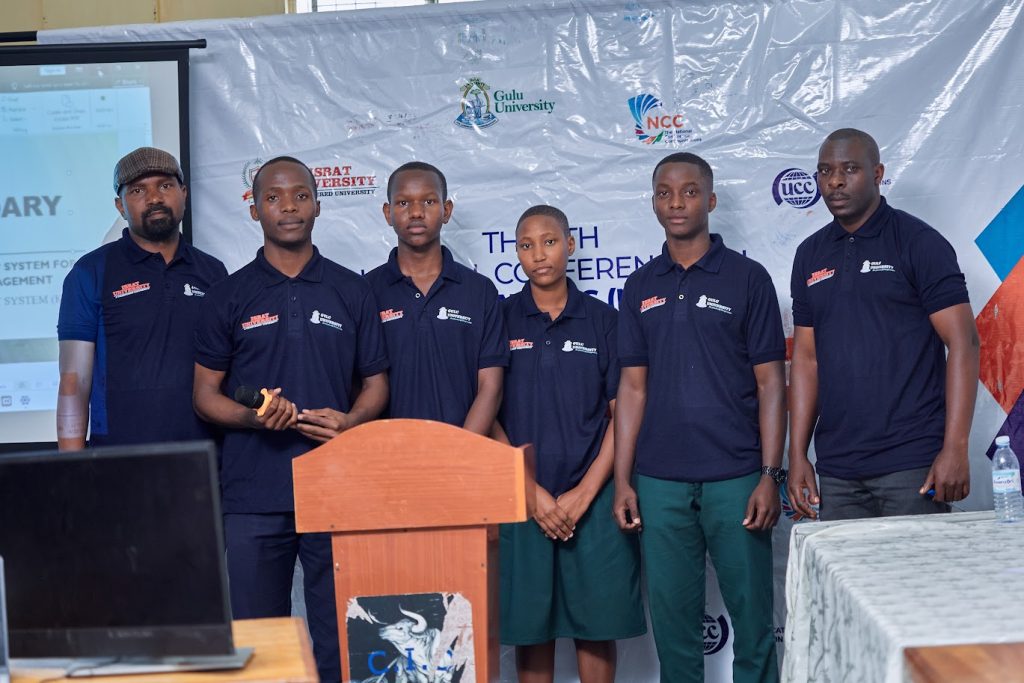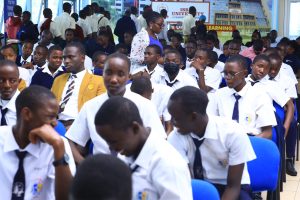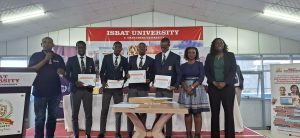St. Mary’s College Rushoroza — IntelliTutor AI: Empowering Minds, One Answer at a Time

Revolutionizing Learning for Ugandan Students
In the evolving landscape of education, a remarkable innovation is emerging from St. Mary’s College Rushoroza in Uganda. A team of visionary students has created IntelliTutor AI, a web-based educational assistant designed to support learners with instant, accurate, and syllabus-aligned academic help. Built entirely by students, this intelligent tool is reshaping how young Ugandans learn, revise, and access information — bringing modern technology into the heart of the classroom.
Across Uganda, thousands of students face the same challenge: accessing reliable academic resources that align with the national curriculum. Libraries are often outdated, the internet is filled with conflicting content, and teachers, though dedicated, manage large classes that make personalized attention difficult. Recognizing this gap, four passionate students — Rwego Edward, Ayebare Paul, Arinda Joshua, and Ahebwa Ekitinisa — developed IntelliTutor AI, a locally tailored learning companion that bridges technology and the Ugandan syllabus. Their project directly supports Sustainable Development Goal 4 (Quality Education) and Uganda’s National Development Plan III, which emphasize digital learning and innovation.
IntelliTutor AI offers students more than just answers — it provides understanding. The platform features a real-time AI Chat Page for instant academic responses, a Quiz Arena with curriculum-based self-tests, and an IntelliWrite tool for essay writing, summarizing, and comprehension practice. Its Academic Tube section hosts educational video tutorials, while EduPulse keeps learners updated with the latest education news. Together, these features form a complete digital study ecosystem that encourages independent learning, creative thinking, and collaboration.
What makes this innovation even more impressive is how it was built. Using Node.js, HTML, CSS, and MongoDB Atlas, the students created a responsive, full-stack web application that works seamlessly across devices. To keep the project sustainable, they relied on free development platforms like Replit and Render, ensuring that their solution remains cost-effective and accessible to schools nationwide. Educational videos from YouTube were embedded to enhance understanding visually, and careful prompt engineering was used to fine-tune the AI to respond with Uganda-specific context and accuracy.
The development process was as educational as the tool itself. The students began with brainstorming sessions, paper sketches, and mockups before writing their first lines of code. They learned to divide roles — Rwego leading the code and database integration, Ayebare handling interface design, Arinda developing quizzes and testing, and Ahebwa documenting and presenting their findings. Every challenge they faced, from technical errors to time constraints, became a learning experience in resilience and teamwork. When their AI initially gave foreign content, they refined it through local data prompts. When hosting funds were unavailable, they found free alternatives. Through persistence and creativity, they built a system that works.
The skills gained throughout the project go far beyond coding. The team learned communication, problem-solving, research, and time management, alongside core ICT competencies such as backend programming, database management, and user interface design. By blending academic knowledge with real-world innovation, IntelliTutor AI became not only a solution for others but also a classroom in itself for its creators. They now stand as role models for young Ugandans who dream of using technology to solve national challenges.
The impact of IntelliTutor AI is already being felt. For students, it is a convenient and trustworthy companion that supports revision and boosts confidence. For teachers, it acts as a digital assistant, offering extra support in large classrooms. For communities, it enhances digital literacy and inspires young innovators to explore STEM fields. The project aligns perfectly with Uganda’s goal of transforming education through technology, while also contributing to SDG 9 (Innovation and Infrastructure) and SDG 10 (Reduced Inequalities) by ensuring access to quality learning tools for all.
To ensure sustainability, the team designed the project to run on free, open-source software that requires minimal maintenance. Their roadmap includes adding local language support such as Luganda, Runyankore, and Kiswahili, developing offline versions for rural schools, and partnering with schools and NGOs to scale the platform nationally. These plans ensure that IntelliTutor AI remains not just a school project, but a growing innovation ecosystem that can support thousands of learners in the coming years.
Ultimately, IntelliTutor AI is a powerful reminder that the future of education in Uganda lies in the hands of its young innovators. Guided by mentorship from teachers and inspired by national initiatives like UCC’s ICT Clubs Program and KAWA CONNECT, these students have shown that with creativity, collaboration, and purpose, learners can become inventors. They are not just using technology — they are shaping it for the next generation.
The success of IntelliTutor AI is more than a technical triumph; it’s a story of youth empowerment, teamwork, and national pride. It shows that when innovation meets education, transformation follows. The classroom of the future is already here — and it speaks with a Ugandan voice.
To explore their work, watch the demo video at YouTube – IntelliTutor AI or visit IntelliTutor AI – Your Intelligent Learning Companion.
For collaboration, mentorship, or school partnerships, contact Project Lead, Rwego Edward, at St. Mary’s College Rushoroza.



